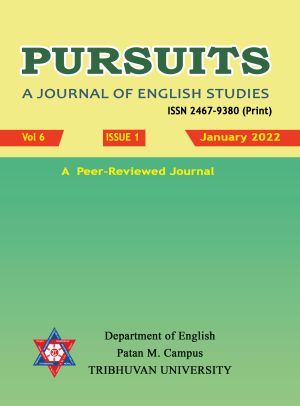The Dialectics of Patriarchal Chauvinism in Susan Glaspell’s Trifles: A Feminist Study
DOI:
https://doi.org/10.3126/pursuits.v6i1.46846Keywords:
feminism, patriarchy, subjugation, ideology, domination, homicideAbstract
Feminist critics always champion and cherish their freedom, equality and justice in social status against patriarchal domination. In many societies, males consider themselves superior to females in terms of social, economic, cultural, physical and political status. They are engaged in social activities leaving the women to content themselves with household chores, children and other frivolous activities. This paper explores, how females get dominated in the play Trifles . The dramatic tension in the play arises when men have legal interest whereas the women only collect the trivial things to unravel the murder mystery of Mr. Wright. Men do not care about the trivial things that females always focus in the play. Instead, they mock and laugh at the females’ interest on trivial things. This research employs the feminist criticism proposed by Helen Pankhurst as the conceptual frame work to invigorate the study. She supports women’s rights on the grounds of equality between the genders, meaning that women should receive the same opportunities, rights, authority and treatment as men. It answers the questions: “How are female characters dominated in the play Trifles? and what might be the ultimate consequences of utter male domination in the family?” Overtly or covertly, females always intend to subvert the patriarchal chauvinism through their rebellious activities in the family and society.




